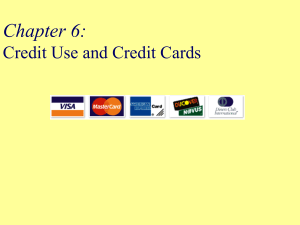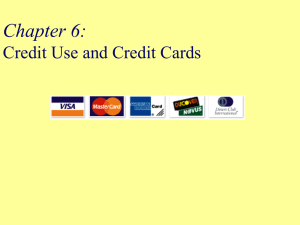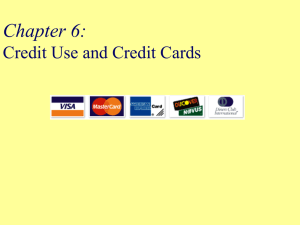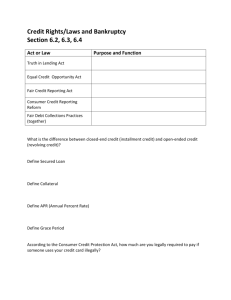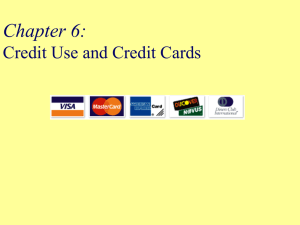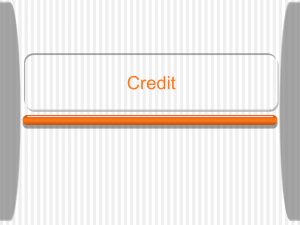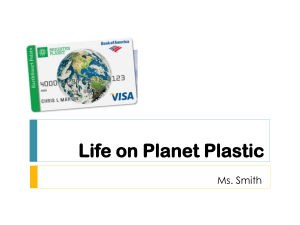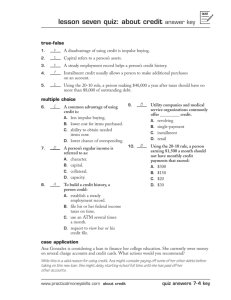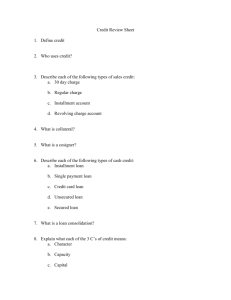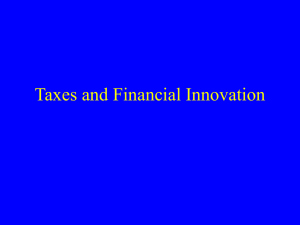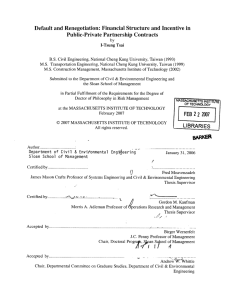Chapter 6 (Credit)
advertisement
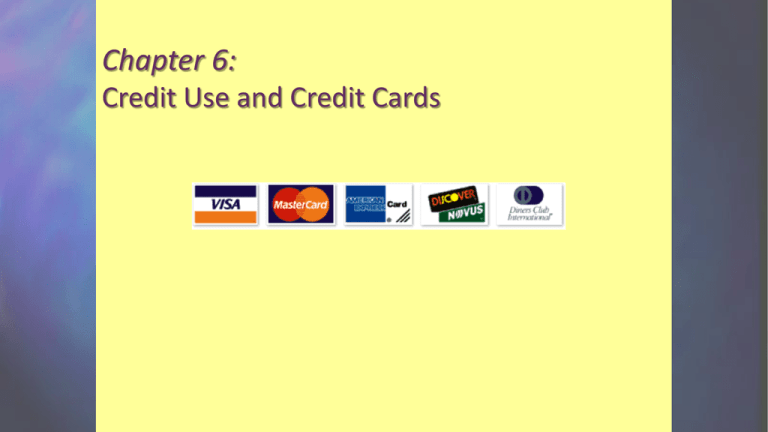
Chapter 6: Credit Use and Credit Cards Objectives • Compare and contrast installment and non-installment credit and discuss the costs of credit. • Discuss reasons for and against using credit. • Describe the types of charge accounts. Objectives • Describe the process of opening a credit account and the procedures lenders use to evaluate credit applicants. • Manage your credit card and charge accounts properly. What is Consumer Credit? Receiving products, services or cash now, and paying for them in the future. Before you use credit, think about... • Could I pay cash or make a down payment? • Do I want to use savings for this purchase? • Does purchase fit with my goals and budget? 6-2 What is Consumer Credit? (continued) • Does purchase fit with my goals and budget? • Could I use the credit I’ll need another way? • Can I wait to buy it? • What are the opportunity costs of postponing the purchase? • What are the economic & psychological costs of using credit for the purchase? 6-3 Credit Use and Credit Cards • Consumer • Installment • Non-installment • Open-ended http://bcove.me/kxdg9zc4 Jean Chatzky talks about Millenials and credit cards While the study found that just 12 percent of mobile phone users take advantage of mobile payment services, this number has quadrupled since 2009. The survey also asked those who didn't use mobile payments why they haven't adopted the technology. Here's what they said: •42 percent are concerned about security. •37 percent said they didn't see any benefit from using mobile payments. •36 percent said it was easier to pay with another method, such as cash or credit card. •31 percent said they didn't have the necessary feature on their phones. Closed vs. Open-End Credit Advantages of Credit • Current use of goods and services • Demonstrates financial stability • Use for financial emergencies • Convenience when shopping • Safer than cash Reasons For Using Credit • Convenience • Emergencies • Identification • Reservations Reasons For Using Credit • Consume expensive products earlier • Enjoy the good life • Take advantage of free credit • Consolidate debts • Protection against ripoffs and frauds Charting the Economy Consumer Credit – Student Loans Total Consumer Credit Disadvantages of Consumer Credit • Purchases are more expensive • Temptation to overspend • Possible financial difficulties • Possible loss of merchandise due to late or non-payment • Ties up future income Example of Credit Card Payoff Payment Information Account Summary (Interest Rate = 14.50%) New Balance Total .....................................................................$2,113.28 Current Payment Due ......................................................................$46.00 Total Minimum Payment Due............................................................$46.00 Payment Due Date........................................................................10/1/14 Late Payment Warning: If we do not receive your Total Minimum Payment by the date listed above, you may have to pay a late fee of up to $35.00 and your APRs may be increased up to the Penalty APR of 27.24%. Minimum Payment Warning: If you make only the Total Minimum Payment each period, you will pay more in interest and it will take you longer to pay off your balance. For example: If you make no additional charges using this card And each month you pay You will payoff the balance shown on this statement in about And you will end up paying an estimated total of Only the Total Minimum Payment 8 years $3,483 $73 3 years $2,620 (Savings = $863) Example of Credit Card Payoff (cont.) Payment Information Account Summary (Interest Rate = 21.24%) New Balance Total .....................................................................$3,041,.89 Current Payment Due ......................................................................$85.00 Total Minimum Payment Due............................................................$85.00 Payment Due Date........................................................................10/1/14 Late Payment Warning: If we do not receive your Total Minimum Payment by the date listed above, you may have to pay a late fee of up to $35.00 and your APRs may be increased up to the Penalty APR of 29.99%. Minimum Payment Warning: If you make only the Total Minimum Payment each period, you will pay more in interest and it will take you longer to pay off your balance. For example: If you make no additional charges using this card And each month you pay Only the Total Minimum Payment $115.26 You will payoff the balance shown on this statement in about And you will end up paying an estimated total of 15 years $7,530.04 3 years $4,149.36 (Savings = $3,380.68) Establishing a Debt Limit • Debt-payments-to-income method • Ratio of debt-to-equity method • Continuous-debt method How to Calculate Debt Payments-to-Income Ratio Credit Capacity Indicators Debt To Equity Ratio total liabilities = Should be < 1 net worth* *Excluding home value 6-10 Fair Credit Reporting Act Is your credit report accurate? • If you are denied credit based on your report, you can get a copy of your credit report free within 60 days of your request • Obsolete information must be deleted • Only authorized persons have access to your report • Adverse data can be reported for seven years or bankruptcy for ten Sample Dispute Letter Open-Ended Charge Accounts PROCESS FOR OPENING: • Application • Investigation • Credit ratings and risk scoring Avoiding and Correcting Credit Mistakes Fair Credit Billing Act • Notify creditor of error in writing in 60 days • Send it to the correct address • They must respond within 30 days • Credit card company has 90 days to resolve the problem • Won’t affect your credit rating while in dispute • You can withhold payment on shoddy goods Managing a Charge Account CREDIT STATEMENTS: • • • • Billing date/Due date Transaction/Posting dates Grace period/Minimum payments Credit for merchandise returns/Errors/ Correcting errors Managing a Charge Account COMPUTATION OF FINANCE CHARGES: • Annual Percentage Rate (APR) • Periodic Rate • Average Daily Balance What Should You Do If You are Denied Credit? • You have the right to know the specific reason why • Ask yourself if you can afford the item • Check your credit report • You are entitled to have errors in your credit report corrected • You have the right to provide a 100 word explanation Protecting Against Credit/Debit Card Fraud • Sign new cards as soon as they arrive • Treat the cards like money • Shred anything with your account number on it • Don’t give your number over the phone unless you make the call • Get a receipt after every transaction • Check your statements for errors Measuring Your Credit Capacity • Ask yourself..... • can you afford the loan? • what do you plan to give up in order to make the payment? • Cosigning a loan • if the person doesn’t pay, you will have to • co-signers often have to pay • it can affect your credit report Criteria Used to Grant Credit 5 C’s of Credit • Character • Capital • Capacity • Collateral • Conditions What Creditors Look For • Character - do you pay bills on time? • Capacity - can you repay the loan? • Capital - what are your assets and net worth? • Collateral - what if you don’t repay? • Conditions - what economic conditions would affect your repayment of the loan? Five Primary Areas of Interest in Calculating FICO Score What Your FICO Score Looks At Payment History (35%) Do you pay your bills on time. Amount Owed (30%) Debt ratio (Below 30%) Length of Credit History (15%) How long have your accounts been established? Types of Credit (10%) Credit cards, retail accounts, installment loans, mortgage loans, etc. New Credit (10%) Opening several accounts in a short period of time represents a greater risk. It’s OK to request and check your own credit report. Credit Score Breakdown Credit Score 499 and Below 500-549 550-599 600-649 650-699 700-749 750-799 800+ Percentage 2% 5% 8% 12% 15% 18% 27% 13%
